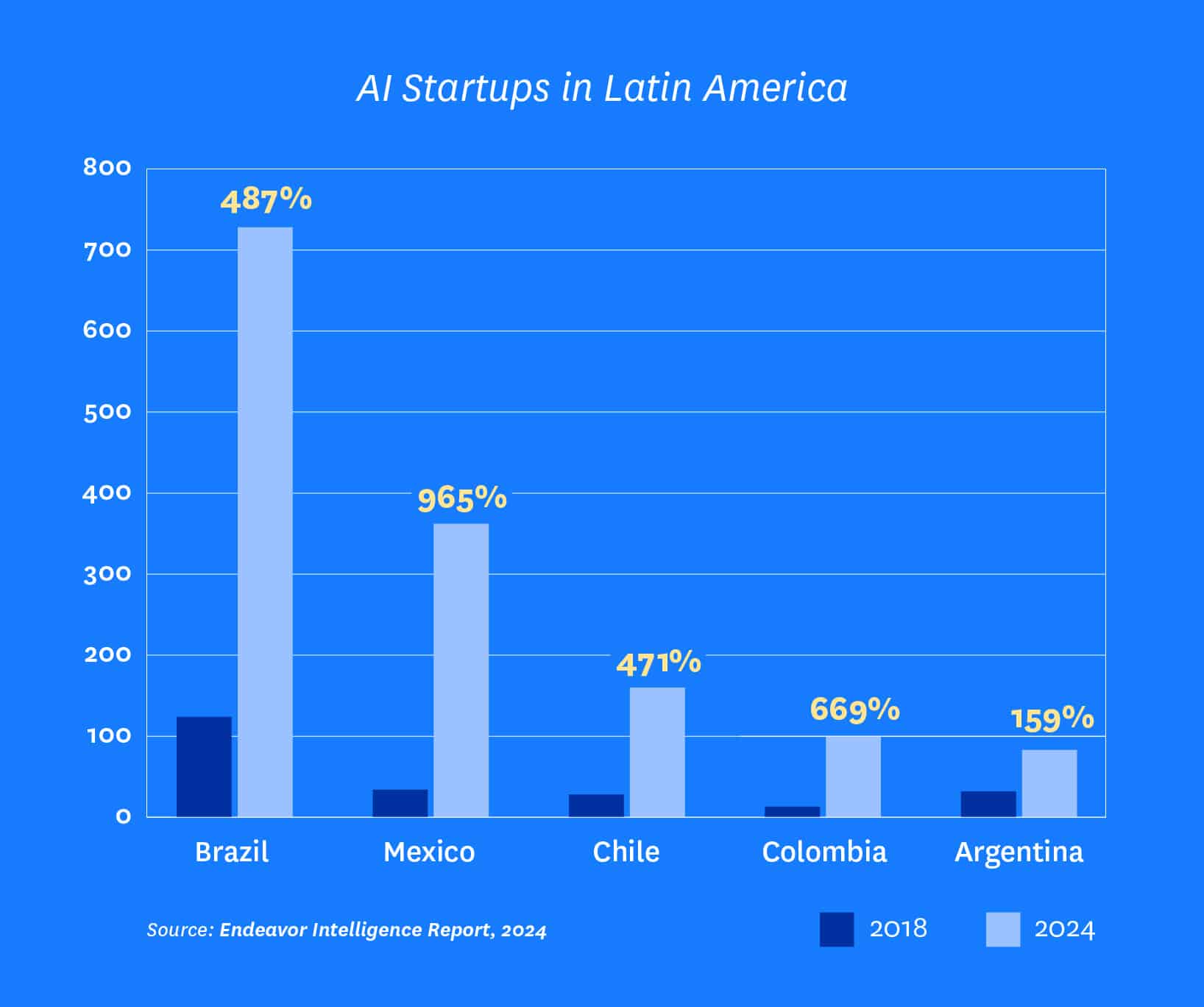|
Getting your Trinity Audio player ready...
|
By now, most people have heard of artificial intelligence (AI) such as ChatGPT, DeepSeek, Gemini, and others. While many of us have already integrated this technology into our daily lives, uncertainty still lingers. Questions around its power, purpose, and risks continue to surface, especially as conversations shift from curiosity to capability.
The good news? Skynet hasn’t been built yet. And although it might sometimes feel like we’re nearing that sci-fi future, the reality is far less ominous. Large language models—the engines behind ChatGPT and similar tools—are not autonomous. They don’t make decisions on their own. Thankfully, humans remain in control to shape, guide, and optimize this technology for meaningful use.
AI adoption in Latin America continues to grow but maintains a narrative of careful hopefulness. Latin America’s AI adoption rate stands at 40 percent, trailing behind leading regions such as India (59 percent), the United Arab Emirates (58 percent), and Singapore (53 percent). This gap reflects systemic challenges, from infrastructure gaps to regulatory and public uncertainty.
According to a global study by KPMG and the University of Queensland, approximately 61 percent of people worldwide are cautious about trusting AI. In contrast, the Latin American region is emerging, pushed by economies like Brazil, where public trust in AI is significantly higher (84 percent) and fundamental for the growth of companies integrating AI into their operations in the region to an average of 47 percent.
This is how the spark ignites, with optimism being translated into tangible progress. Latin America has started to actively embrace AI technologies with fresh enthusiasm while using its unique cultural creativity and business acumen to develop solutions that are both inventive and well-adapted to each local conditions.
“As the world accelerates toward an AI-driven future, we cannot afford to sit on the sidelines. Latin America may currently trail in adoption, but this is not a setback—it’s an invitation.”
Juan Loaiza
Latin American initiatives in AI-driven farming and fintech advancements show that innovative development can progress beyond Western models. It can thrive on its own terms. The momentum is measurable: AI adoption in the region had an 18 percent increase in 2024 reaching 40 percent, surpassing the global average in enthusiasm and optimism.
Many countries are starting to lead the charge, with three sectors driving the transformation:
- Fintech: AI-powered credit scoring and fraud detection are helping bridge the financial gap for the 70 percent of Latin Americans who are underbanked. Mexico’s Kapital uses AI to serve small and medium-sized enterprises, which drive 50–60 percent of regional GDP but receive only 15 percent of institutional financing.
- Agritech: In Brazil, where agriculture accounts for nearly 30 percent of GDP, AI is being deployed to enhance precision farming. Argentine startup Kilimo has reduced water usage by 20 percent while maintaining crop yields—saving an impressive 72 billion liters of water.
- Healthcare: Brazilian health insurer Alice uses AI-powered triage systems to cut patient screening times by 24 percent, a critical improvement amid a shortage of medical professionals.
Yet, for all the progress, scaling AI across the region is far from straightforward. The road ahead is lined with structural challenges that demand urgent attention.
One of the most pressing obstacles is infrastructure. For instance, in 2022, only 67.3 percent of households in the region had internet access, according to the UNPD, whereas in OECD countries, the figure was much higher at 91.1 percent. Internet access is a basic necessity for using digital tools, especially AI.
Cloud services, essential for processing large volumes of data, remain fragmented and underdeveloped. Brazil is a notable exception, benefiting from an 85 percent clean energy grid that supports the high energy demands of AI. But most countries in the region lack the energy and digital infrastructure to support sustained AI growth.
Economic inequality stifles inclusive AI adoption. While 71 percent of Chileans, 72 percent of Mexicans, and 65 percent of Brazilians are somewhat excited about the possibilities of AI (Ipsos/Google, 2025), access tells a different story. In Argentina, urban centers like Buenos Aires lead in adoption, while rural areas lag behind. With only 4 out of 10 rural Latin Americans having access to basic internet (UNPD, 2024), effectively excluding millions from the digital economy. While São Paulo leads Brazil in AI technological development, the North and Northeast regions do not receive adequate AI services. AI will deepen existing divides unless there are specific investments in connectivity training and rural innovation.
Regulatory uncertainty further hampers innovation. Just 17 percent of companies in the region have established clear AI governance frameworks. While 55 percent of Latin Americans support AI regulation, efforts remain fragmented across borders, creating inconsistency and confusion for developers and businesses alike.
An Emerging Ecosystem
Despite these challenges, there is reason to be hopeful. As highlighted in a recent Endeavor Intelligence report, AI startups across Latin America have surged between 2018 and 2024, marking an exciting shift in the region’s innovation landscape.

These startups aren’t just experimenting—they’re solving deeply local problems:
- Brazil: Fintech startup Magie integrates AI banking assistants into WhatsApp, processing over $16.5 million in transactions. Meanwhile, agritech unicorn NotCo uses AI to replicate animal products with plant-based alternatives—now sold in US retailers like Walmart.
- Mexico: Proptech company Morada.ai has grown 400 percent year-over-year thanks to its AI-powered real estate assistant, Mia. Medtech startup BioGrip is developing neural interface prosthetics for the 800,000 amputees in the region.
- Chile: Fracttal’s AI-driven predictive maintenance tools are used by global clients like FedEx and 3M, reducing downtime in industrial operations by 30 percent.
What sets these startups apart is their ability to build AI models that reflect Latin America’s cultural and linguistic diversity. Unlike many global solutions, which default to English, these tools are being developed in Spanish, Portuguese, and even indigenous languages—making them far more accessible and contextually relevant.
Looking ahead, the future of AI in Latin America hinges on three key priorities:
- Investment: While global AI investment hit $190 billion, Latin America only captured $8.2 billion, according to 2024 insights published on JPMorgan. Closing this gap will require stronger public-private partnerships. Countries like Brazil are already setting an example, launching AI-powered clean energy initiatives and building national strategies to become AI hubs.
- Education: We must double down on digital literacy and technical training—not just for future engineers, but across all sectors. Integrating AI into everyday life requires equipping people at every level with the tools to understand, adopt, and adapt.
- Accessibility: Governments and companies must do more to open doors. That means creating environments where communities can experiment, learn, and apply AI to solve the real challenges they face—from education and healthcare to climate resilience and financial inclusion.
The way I see it, Latin America’s AI journey is a story of contrasts, a region brimming with creativity and ambition yet held back by long-standing inequalities. And still, the potential is undeniable. By 2030, generative AI could contribute $1.8 billion in annual revenue to the region, according to Grand View Research.
But only if stakeholders embrace a model of radically inclusive growth.
As the world accelerates toward an AI-driven future, we cannot afford to sit on the sidelines. Latin America may currently trail in adoption, but this is not a setback—it’s an invitation. An invitation to lead with intention, to innovate with purpose, and to claim our seat at the table of the next technological revolution.
The time for waiting is over. It’s not enough to open the door; we must step boldly through it, championing progress and bridging the gap before it grows wider.
The future of AI needs the Latin American voice, our vision, and our leadership.
The views expressed in this article are those of the author and do not necessarily reflect the position of Hispanic Executive or Guerrero Media.
Juan Loaiza, senior director of strategy and performance at Ankura Consulting Group, is a results-oriented and strategic leader with over thirteen years of comprehensive experience driving revenue growth and operational excellence. His background encompasses strategic planning, rigorous quantitative analysis, impactful team leadership, and consistent performance optimization across diverse industries. Fluent in Spanish, Portuguese, and English, Loaiza possesses a unique ability to navigate complex cultural and business landscapes within Brazil, Latin America, and the United States, fostering strong client relationships and achieving significant business outcomes.
Loaiza holds a master’s degree in public policy and dual bachelor’s degrees in economics and public administration from Michigan State University, as well as the following certifications: Six Sigma Green Belt, Project Management Professional (PMP), Certified Scrum Product Owner (CSPO), PROSCI Change Management, and Professional Agile Leadership (PAL).
His expertise lies in developing and implementing data-driven strategies, optimizing operational processes, and leveraging technology to enhance operations alignment. Beyond traditional roles, Loaiza’s has worked with AI, cryptocurrency, and blockchain initiatives demonstrating his innovative mindset and understanding of emerging technologies that can be leveraged to enhance revenue operations. His creation of the cryptocurrency index Yenso further exemplifies his analytical skills and ability to identify and capitalize on market trends.
Furthermore, his leadership in revitalizing the ALPFA Nashville chapter since 2023 demonstrates his ability to build and lead a community, increase engagement through strategic initiatives, and foster collaboration—skills directly transferable to leading and aligning revenue teams.

